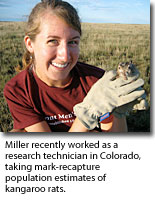 Graduate students and CMC alumni Gabe Rocklin and Jennie Miller, both Class of 2007, have been awarded National Science Foundation (NSF) Graduate Research Fellowships, enabling them to receive three years of support for advanced study in the mathematical, physical, biological, engineering, and behavioral and social sciencesincluding the history of science and the philosophy of scienceand to research-based Ph.D. degrees in science education.
Graduate students and CMC alumni Gabe Rocklin and Jennie Miller, both Class of 2007, have been awarded National Science Foundation (NSF) Graduate Research Fellowships, enabling them to receive three years of support for advanced study in the mathematical, physical, biological, engineering, and behavioral and social sciencesincluding the history of science and the philosophy of scienceand to research-based Ph.D. degrees in science education.
Rocklin and Miller were among the nearly 10,000 student applicants who vied for a total of 913 Fellowships.
To be eligible, students must have just started graduate school or have just completed their first year in any field in physical sciences, biological sciences, social sciences, or engineering.
Miller received her award while on a current Fulbright scholarship studying wildlife ecology in Indiaspecifically, researching the impacts of local villagers and natural resource harvesting on pheasant populations in the nearby Great Himalayan National Park. During recent fieldwork, living in a remote village, she watched villagers collect firewood, fodder for their animals, and mushrooms and medicinal plants to sell in the market, and observed challenges such activities pose for the Indian Forest Department in conserving park flora and fauna.
"My work sparked my interest in community-based conservation and the difficulty of conserving wildlife in developing countries," Miller says. "With this in mind, I intend to use the NSF grant for a Ph.D. in ecology and focus on a project that addresses local communities, wildlife conservation and climate change, perhaps with fieldwork in India."
Miller, who majored in biology at CMC, credits her liberal arts education for her NSF grant eligibility. During her sophomore, junior and senior years, she worked as a research assistant with Joint Science professors Dan Guthrie, Diane Thomson, and Donald McFarlane, and wrote her senior thesis on the impact of forest disturbance on poison dart frog densities, using data she collected at the Firestone Reserve in Costa Rica in 2006.
Rocklin currently is pursuing a Ph.D. in biophysics at the University of California, San Francisco, (five of the 913 NSF awards went to students engaged in Biophysics study), but says he hasn't made a decision as to what he will study with the Fellowship support.
"One of the really great things about the NSF Graduate Research Fellowship is that once the NSF has decided to support you as a person, you can do any type of research that you want," Rocklin says. "It's different from many grant systems in which someone receives funding due to the merits of a specific project, which often forces people to pursue more conventional, lower-risk projects."
Rocklin says that most graduate students typically choose a research advisor at the end of their first year and then target a specific project to work on.
Right now, two areas of biophysics interest Rocklin: studying how small organic molecules, such as drugs, interact with proteins (and how to predict the interactions computationally), and studying how to engineer proteins in order to create new functions that don't already exist in biology.
"The full length of the Ph.D. will probably be five to seven years, and I am already a year in," he says. "The NSF Graduate Fellowship will support me for three of those years."
For those three years, the Fellowship will make a $40,000 annual payment to U.C. San Francisco. $30,000 per year will be paid directly to Rocklin as a stipend with the other $10,000 earmarked to pay tuition costs.
To be considered for the Fellowship, Rocklin wrote two essays describing his previous research experience and future goals.
"Working on my senior thesis at CMC with Dr. Emily Wiley, assistant professor of biology in the Joint Science Department, was very important because it gave me a substantial amount of research experience to describe, and I used it to demonstrate my ability to conduct research and work as part of a team," Rocklin says.
"Knowing my CMC professors personally also helped me because one of the reviewers of my fellowship application specifically commented about how positive my recommendations were. Two of my three recommendation letters were from CMC professors."
Alumni Awarded
NSF Fellowships
Topics
Contact
Office of Strategic Communications & Marketing
400 N. Claremont Blvd.
Claremont, CA 91711
Phone: (909) 621-8099
Email: [email protected]
Media inquiries: CMC Media
Email: [email protected]
